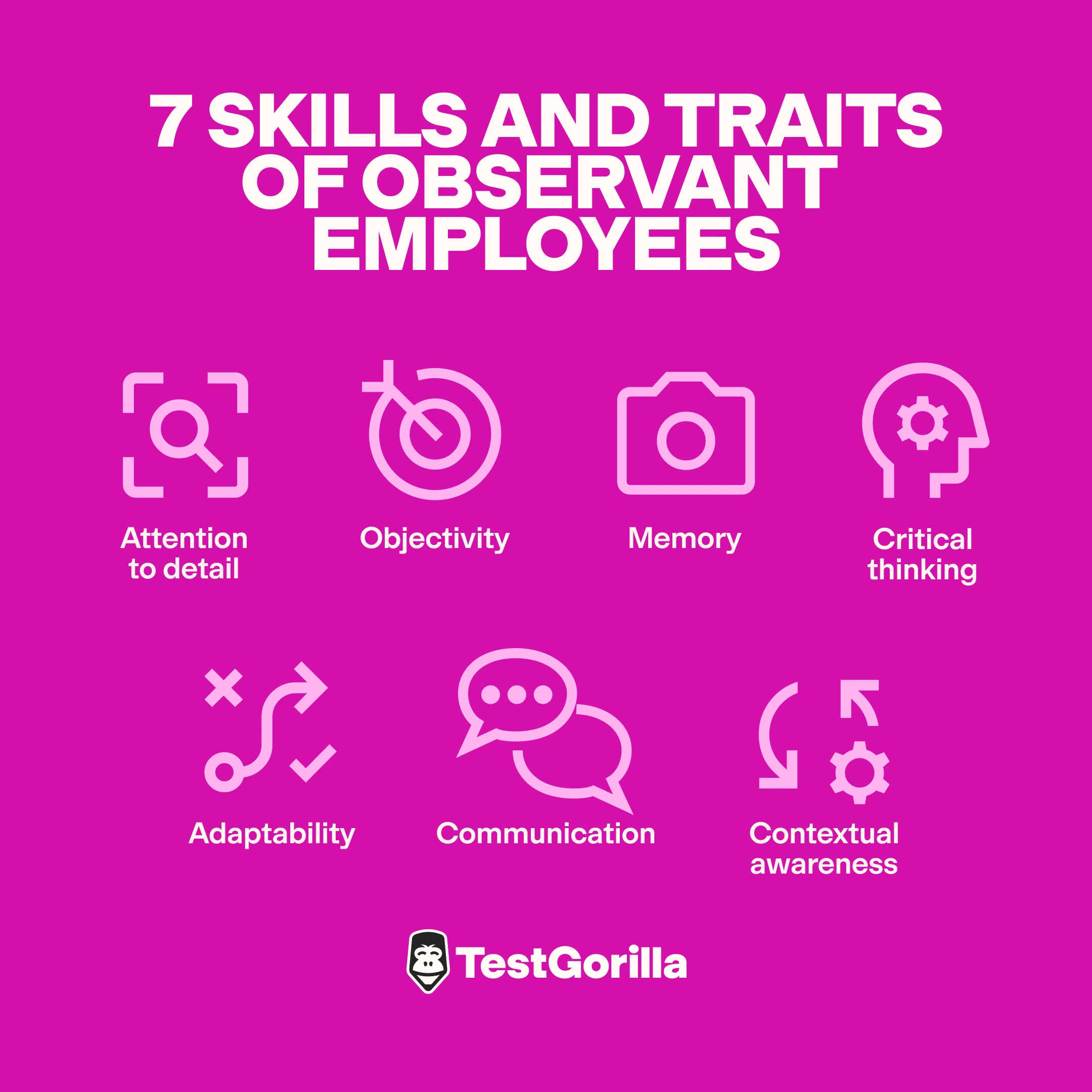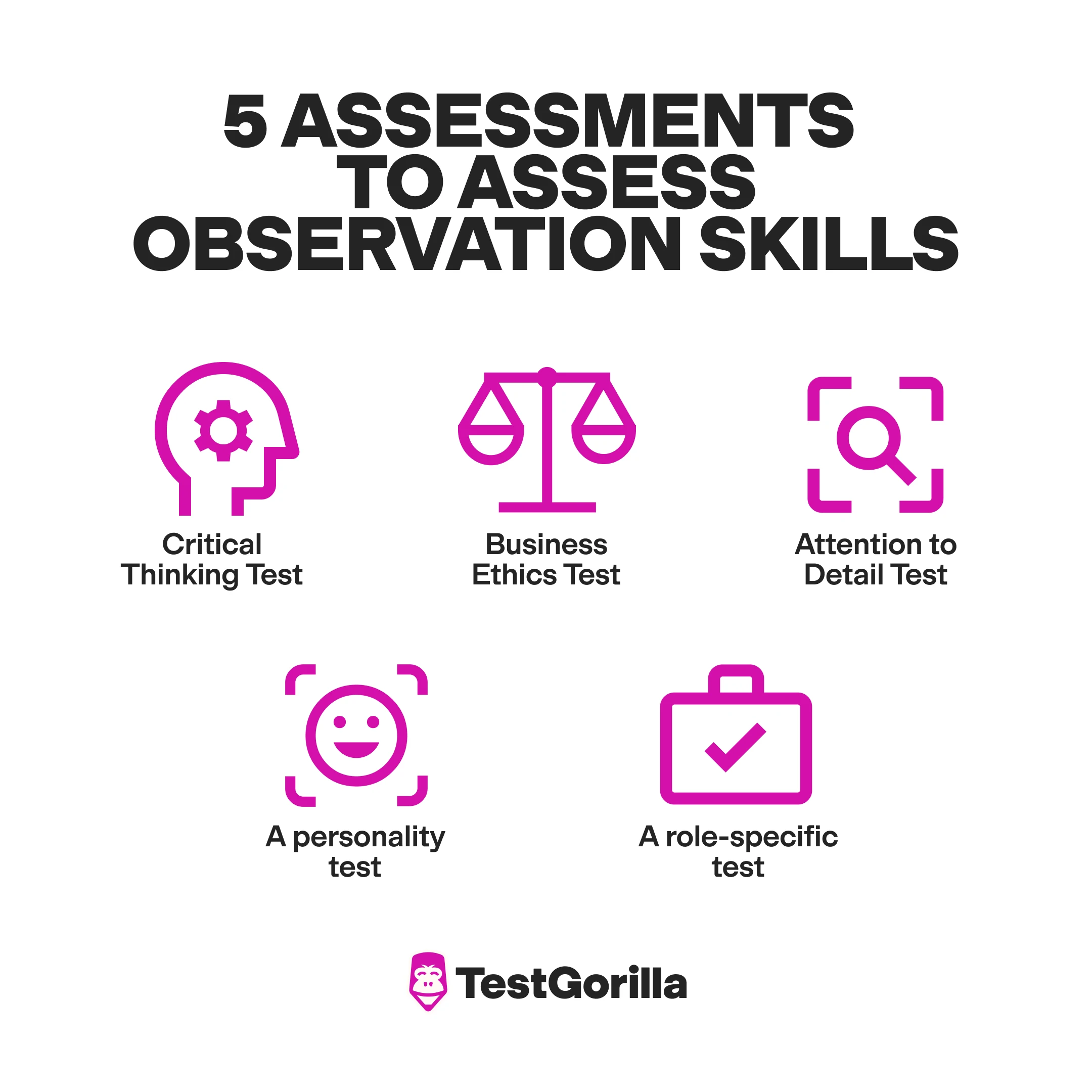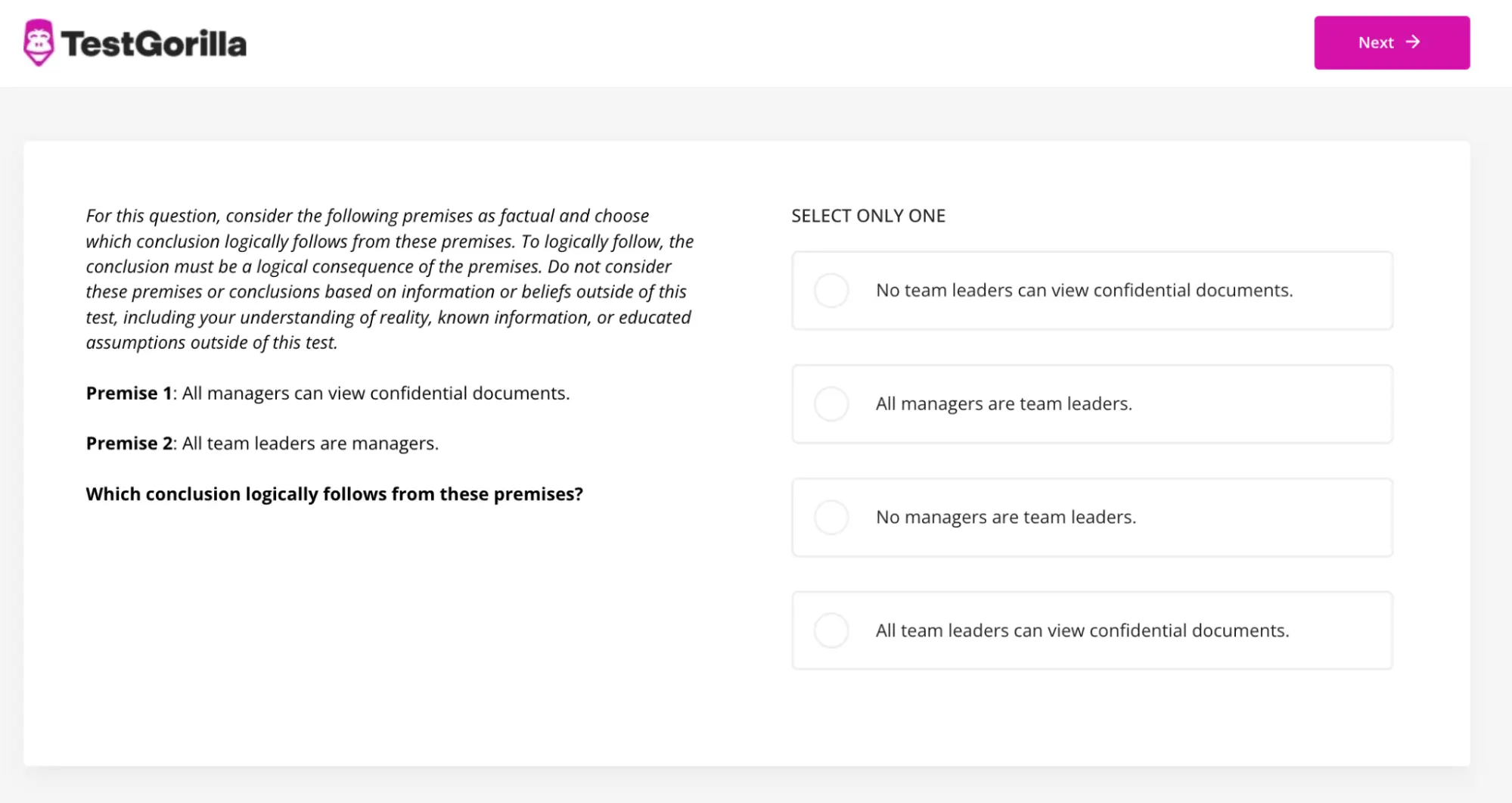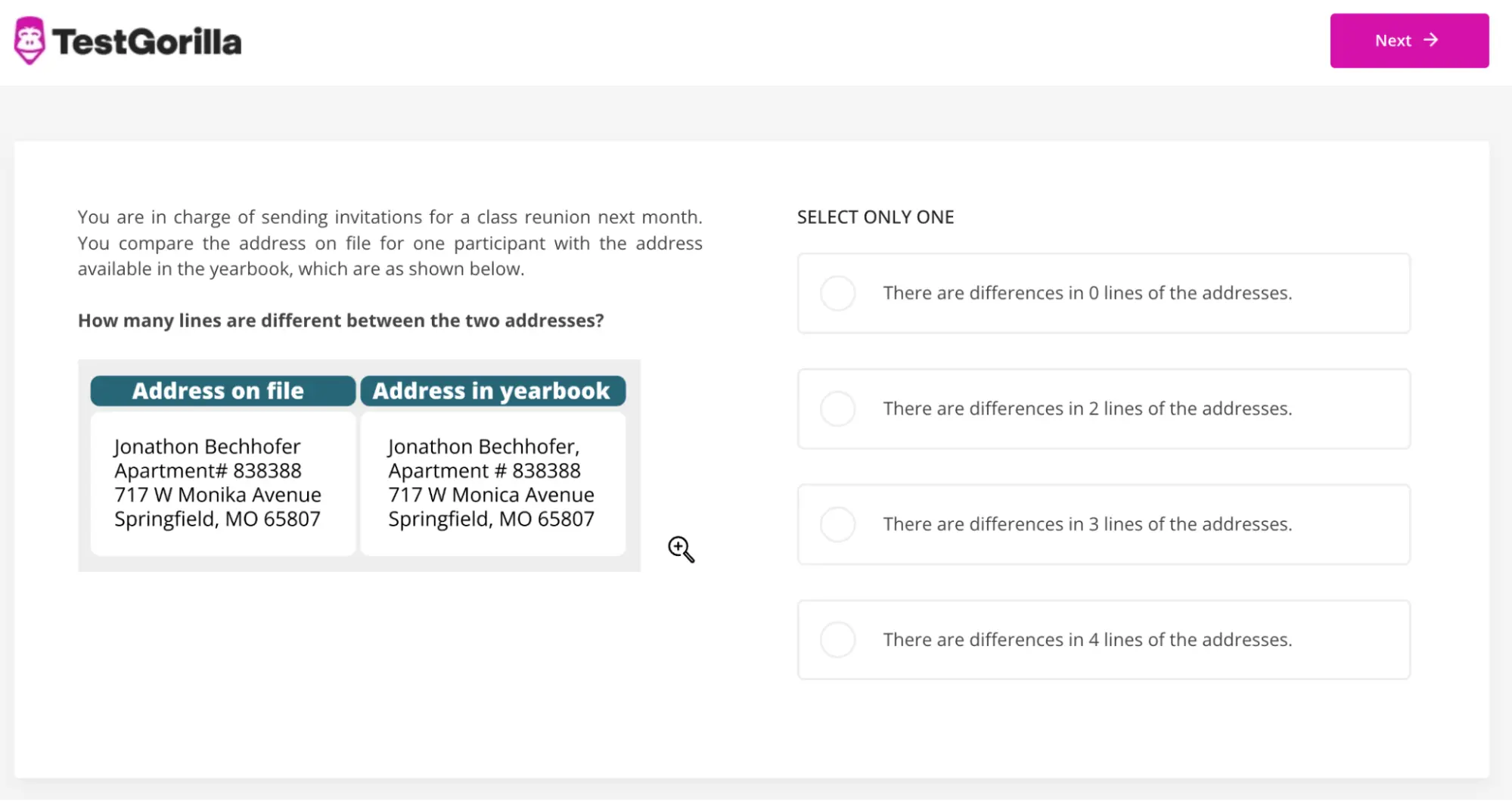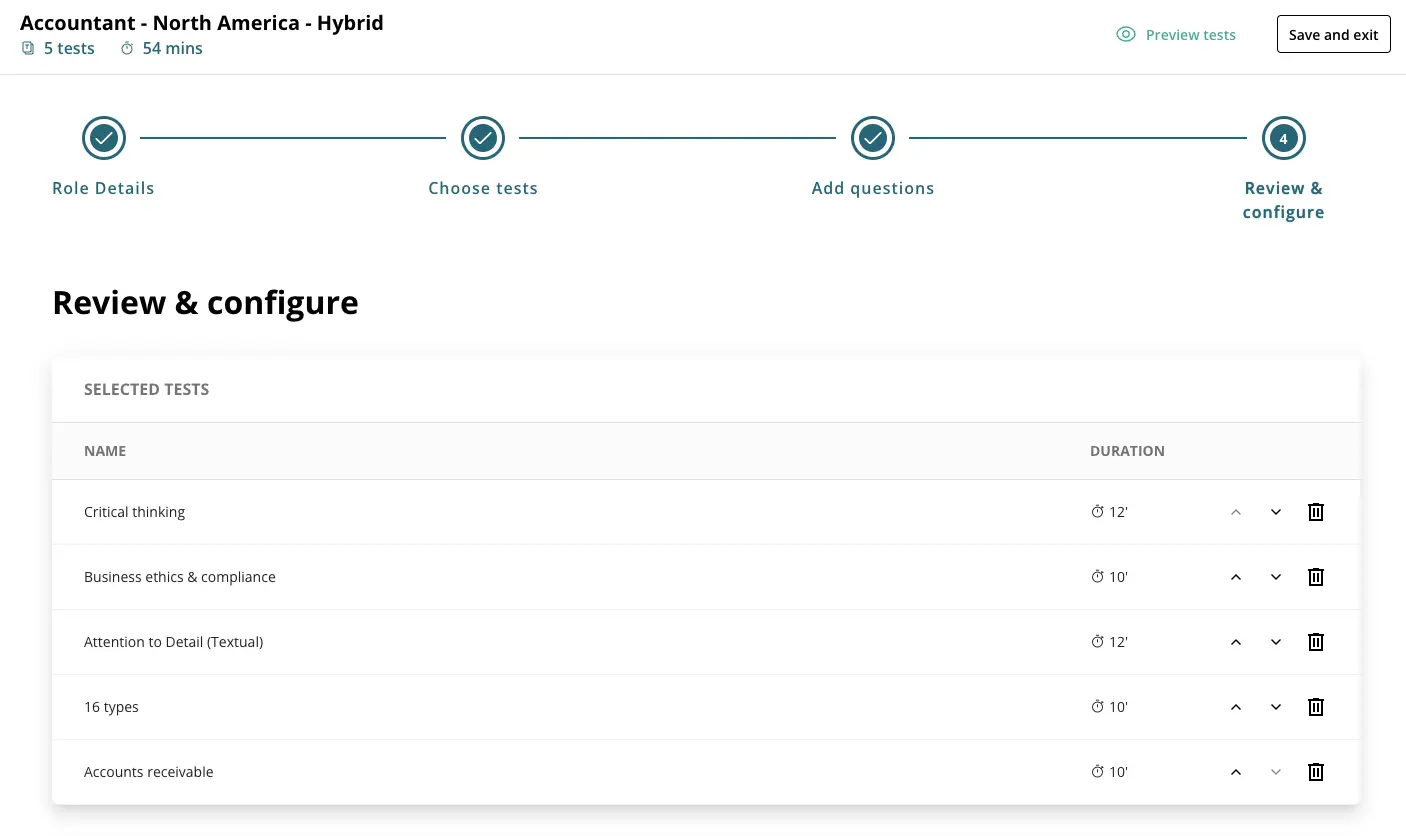Test your candidate’s observation skills for free
Let’s face it: Without observation skills, even the most talented people turn in poor-quality work.
People with good observation skills, on the other hand, pay close attention to detail, think critically, and work well with others.
Luckily, it’s easy to spot perceptive, hard-working employees by testing for observation skills with talent assessments.
Keep reading to find out the best personality traits, how to improve observation skills, and how to test observation skills with talent assessments.
7 fundamental examples of observation skills
Okay, so why are observation skills important in practice? To dig deep into that question, we need to look at some examples of highly transferable observation skills.
Observation as a skill set: Why are observation skills important?
Good observation skills | In brief |
1. Contextual awareness | The ability to understand different contexts and adjust your working approach |
2. Objectivity | Looking at the facts and avoiding biased decision-making |
3. Adaptability | Noticing your skills are needed elsewhere and switching roles at short notice |
4. Attention to detail | Carefully analyzing problems and spotting hidden details |
5. Memory | Recalling previous projects and applying lessons to future work and problem-solving |
6. Critical thinking | Making confident, objective decisions under pressure and looking at the bigger picture |
7. Communication | Actively listening to others and sharing information clearly during teamwork |
1. Contextual awareness
Understanding context at work means being aware of things that affect your decision-making.
You might need to consider changes in:
Environment
Social dynamics
Team hierarchy
An employee with this observation ability is always willing to learn and adapt to new challenges.
For instance, someone handling customer cancellations knows they must change their approach when working on a tech support line. This is simply because their callers’ needs differ, and they have different targets to hit, such as a daily volume of customers retained vs. call queues reduced by a certain amount.
2. Objectivity
Objective employees care about facts. They look beyond personal bias and emotions and treat everyone equally.
Being objective reduces unconscious bias and stops people from jumping to possibly harmful conclusions. They might ask themselves, Is this decision based on how I feel or on physical evidence?
An objective leader fairly reviews their team using the same scoring system.
Objectivity is an observation skill that helps to improve workplace inclusivity, boosting collaboration.
3. Adaptability
Adaptability is one of the most desirable observation power skills in recruits. Around 71% of executives claim it’s what they look for when hiring leaders.
That’s because it’s a powerful observational ability that helps people spot opportunities where they can help and quickly adjust their workloads to dive in.
For example, a cross-trained retail employee replenishing stock might notice a sales queue growing. However, there’s only one person on the register. An adaptable employee opens a new register to halve the queue and starts scanning items, reducing the co-worker's time and effort and keeping customers happy.
4. Attention to detail
Observant employees have a keen eye for noticing even the most minor details in their surroundings. They have situational awareness and quickly notice visual cues, body language, and slight changes to projects others might not have spotted.
Take the role of a proofreader. Proofreaders are great at spotting tiny details by carefully reading and analyzing text.
Likewise, attentive employees are:
Highly punctual
Well organized
Perseverant
They’re also creative thinkers, trying new ways to solve problems based on small details.
For instance, an engineer might spot a manufacturing flaw the first time they look at a new process, which, although unlikely to cause damage, could speed up processes if fixed.
5. Memory
Good memory skills help people learn from mistakes and become more adaptable. Retaining information helps people think critically about the challenges they face in the future.
They could ask themselves:
What did I do in this situation last time?
What worked well, and what could I improve on?
Who can I reach out to for help?
What haven’t we tried yet?
With accurate memory recall, it’s easier to experiment. Again, you’re looking at a highly creative thinker who can selectively pick out lessons they’ve learned and apply them to new experiments and circumstances.
Candidates with these skills adapt well to active learning on the job, for instance, through interactive tasks and games. Research shows active learners are more likely to retain information for longer than passive or “traditional” learners.
6. Critical thinking
Critical thinkers can easily spot the significance, relevance, and effects of any information they encounter.
Thinking critically is related to objectivity. It involves removing bias and emotion from decision-making and focusing on the facts.
Let’s say a client advisor becomes emotionally invested in a particular customer’s case and wants to take complete control. However, three other valuable customers are waiting for help with complaints from the same advisor and are at risk of canceling their contracts.
An emotional thinker might risk “leapfrogging” their preferred customer ahead of the rest, focusing all of their attention on them and dragging out the others’ cases.
A critical thinker knows the queue is organized that way for a reason. Moving someone ahead could damage the company’s reputation and their own.
So, they might address the invested customer’s concerns, advise a callback, and then attend to the other customers to make sure they’re heard and cared for.
Again, like adaptability, critical thinking is high on employers’ lists when hiring. Around 81% of employers consider the skill very important in new hires.
7. Communication
Strong communicators understand what other employees need, where projects are heading, and what actions to prioritize. They also use non-verbal cues, like facial expressions and eye contact, to decode messages.
Effective communication skills include active listening, meaning good communicators focus on the details of what others say, ask follow-up questions, and respond thoughtfully.
Moreover, observant people share thoughts and ideas clearly and concisely, describing what they have seen in a way that others can understand.
Let’s say a project manager gives status updates to different people and departments. That means they need to adjust their language so it’s easy to read and keep key messages front and center.
Research shows that 50% of business leaders feel high-quality communication boosts their brand reputation, and 33% believe they have made new deals.
Find a five-star communicator with skills tests
Use our talent assessments to assess candidates objectively and find top-notch communicators for your organization.
How to develop observation skills: 5 tips
Learning how to develop observation skills is normally a long-term process. However, the following observation tests could help you become more focused faster.
We include a few ways you, as an HR professional, can help improve observation ability from afar.
Tip | As an employee | As an HR professional |
1. Reduce distractions in the workplace | Clear your desk and let yourself focus on tasks for set periods – train your brain to hone in on important details | Make sure employees have private spaces and discuss training needs with managers |
2. Slow down and be mindful | Practice mindfulness and take moments to reflect to slow down internal “chatter” | Give employees plenty of opportunities for breaks, and supply mindfulness guides and materials |
3. Focus on everyday observations | Keep a private journal of things you notice, and use all your senses to boost observation sensitivity | Supply employees with private journals or development time when they can “just observe” |
4. Use puzzles and games to improve memory and focus | Play word games with others or on your own – logic puzzles and toys such as Rubik’s Cubes help support reasoning skills | Offer skills tests and games designed to sharpen observation skills |
5. Test your memory recall | Regularly test your memory with games and puzzles | Offer memory tests such as Kim’s Game and set regular memory-related personal development tasks |
The best insights on HR and recruitment, delivered to your inbox.
Biweekly updates. No spam. Unsubscribe any time.
How to assess observation skills: 5 assessments
If you work in HR, here’s the fun part.
We’ve compiled a list of five observation tests to help you spot eagle-eyed employees before hiring them. They don’t need years of experience to develop these skills either.
Here’s a quick summary of how to start testing real-world observation skills while hiring and training employees:
Observation skills test | In brief |
1. Critical Thinking Test | Test someone’s ability to reason with logic and spot relevant information |
2. Business Ethics Test | Assess how objectively someone handles problems in line with business and personal ethics |
3. Attention to Detail Test | This observation power skills test judges an ability to spot fine details and focus on complex problems |
4. A personality test | Use a 16 Types test to learn how candidates process details, work with others, and make observations |
5. A role-specific test | Complete your observation assessment with a test built around the role you’re hiring for, such as a programmer |
We dig into more detail below.
1. Critical Thinking Test
Critical thinkers are like Sherlock Holmes – perceptive, detail-oriented, and skilled at recognizing patterns.
TestGorilla’s Critical Thinking observation test helps you assess candidates' approaches to problems, evaluate evidence, and arrive at well-reasoned conclusions.
This test presents candidates with scenarios or questions where they can show:
Thoughtful analysis
Logical reasoning
The ability to distinguish relevant information from distractions
Here’s an example question where an applicant needs to apply logic:
The Critical Thinking test helps you gauge a candidate’s ability to think creatively and adapt to new information.
Why not look closer at preview questions from this test and try some for yourself?
2. Business Ethics Test
People with strong business ethics understand how their decisions affect others and the company's reputation.
Someone with a good ethical compass generally understands how to make judgment calls in difficult situations and consider specific, objective facts before making snap decisions.
Our Business Ethics and Compliance test helps you measure managerial candidates' ability to think objectively about decisions that impact reputation or could violate policy.
It’s a good way to spot applicants who can take themselves “out” of difficult scenarios and make decisions based on facts and business expectations.
3. Attention to Detail Test
Our Attention to Detail Textual test helps you assess candidates’ ability to notice and accurately perceive even the smallest details and learn more about their focus.
Along with the Attention to Detail Visual test, this assessment presents written passages, images, or data sets:
This test's results explore a candidate’s:
Attentiveness
Meticulousness
Overall observation skills
4. A personality test
One of the best ways to assess someone’s adaptability, emotional intelligence, and contextual awareness is to run psychometric testing.
In particular, we recommend the 16 Types test, designed to break down observational abilities and behavioral tendencies.
Based on Carl Jung’s research, this test helps you understand how candidates perceive and process information, make decisions, and interact with others.
This test and other psychometric psychology assessments help pinpoint observational skills by assessing attention to detail, the ability to notice patterns and awareness of surroundings.
Learn how to use personality tests in your hiring process
One of our friendly experts is on hand to demonstrate the benefits of using personality assessments, such as the 16 Types test, for recruiting skilled candidates.
5. A role-specific test
There’s no such thing as an “observation expert,” so while you test observation skills, we suggest you also test aptitude for the role you’re hiring for.
Say you’re looking for a Python developer. In that case, try our Python (coding): Entry-Level Algorithms test, which asks takers to write and execute test code.
Or, you could hire a skilled accountant with an exceptional eye for detail and numeracy skills. In this case, run our Accounts Receivable test and measure their ability to record accurate data and measure balances.
Adding a role-specific test alongside observation skill assessments helps you build a well-rounded picture of potential recruits, such as when hiring a facilitator.
It’s easy to start with a free forever account, where you can test observation skills with a five-step observation assessment.
Don’t just take our word for it. Running multiple tests in a single assessment plan helped our clients, such as Click&Boat, focus on specific skills, boosting its overall hire quality.
Test observation skills and hire conscientious candidates
Try to think of roles or observation activities where observational skills aren’t on the mark. Tricky, right?
It’s all the more reason why, as a recruiter, you should test for them – and, as an applicant, you should develop them. Hiring managers want people who are more than just technically proficient. People with great observational skills are innovators, self-starters, and flexible communicators.
Thankfully, skills-based hiring makes it easy to spot a conscientious candidate in the crowd. You just need a good observation skills test provider.
The best way to get started as a recruiter is to sign up for a free forever plan with TestGorilla.
If you’d prefer a little guidance, book a 30-minute demo and see what our testing system is capable of.
Testing observation skills FAQs
Now that you understand the powers of observation at work and in daily life and know how to set up an observation assessment, let’s run through a few final commonly asked questions.
Why are good observation skills important?
People with observation as a skill set can spot errors, inconsistencies, or defects in products, processes, or services. Observant employees are more likely to identify potential safety hazards, security threats, or risky behaviors in the workplace. What’s more, observation skills give employees a broader perspective and a deeper understanding of their work environment. These skills let them make informed decisions, reducing the risk of costly mistakes or poor judgment.
What are the 4 types of observation assessment?
Participant observation (joining groups and observing others from within as a member)
Non-participant observation (observing others from afar without direct involvement)
Controlled observation (designing control groups and using templates to measure results)
Indirect observation (experimenting with real-time changes, such as natural growth)
What is observation ability in critical thinking skills?
Observation in critical thinking is one’s ability to spot minor details to help make more confident decisions. It sometimes appears as a separate term, critical observation, but the two go hand in hand when looking objectively at solving problems. Critical thinking is one aspect of observation we recommend testing for.
You've scrolled this far
Why not try TestGorilla for free, and see what happens when you put skills first.



